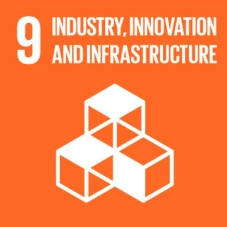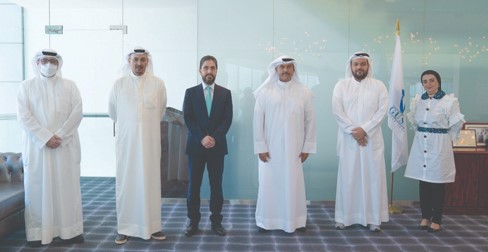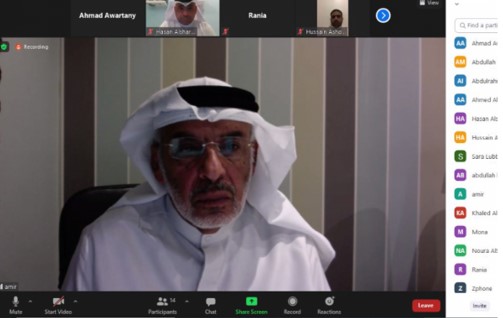SDG9: Industry, Innovation & Infrastructure

SDG 9 aims to build resilient infrastructure, promote sustainable industrialization and foster innovation. SDG 9 has eight targets, and progress is measured by twelve indicators. The first five targets are "outcome targets": develop sustainable, resilient and inclusive infrastructures; promote inclusive and sustainable industrialization; increase access to financial services and markets; upgrade all industries and infrastructures for sustainability; enhance research and upgrade industrial technologies. The remaining three targets are "means of achieving" targets: Facilitate sustainable infrastructure development for developing countries; support domestic technology development and industrial diversification; universal access to information and communications technology.
The goal has interlinkages with other SDGs. While industrialization is connected to SDG 8 (decent work and economic growth) and SDG 11 (sustainable cities and communities), innovation and new skills development will help realise SDG 2 (zero hunger), SDG 6 (clean water and sanitation), SDG 7 (affordable and clean energy) and SDG 11 (sustainable cities and communities).
In 2019, 14% of the world's workers were employed in manufacturing activities. This percentage has not changed much since 2000. The share of manufacturing employment was the largest in Eastern and South-Eastern Asia (18 percent) and the smallest in sub-Saharan Africa (6 percent). Millions of people are still unable to access the internet due to cost, coverage, and other reasons. It is estimated that just 53.4% of the world's population are currently internet users. Estimates suggest that by the end of 2020, the world will have reached just 57% global internet use and 23% in least developed countries, missing target 9.c by a wide margin.
GUST Activities and Collaborations
KFH enhances cooperation with GUST to support studentsActing Group CEO at Kuwait Finance House (KFH), AbdulWahab Essa Al-Roshood emphasized the significance of cooperating with academic institutions, holding strategic partnerships with them in the field of internships, enhancing graduates capabilities, recruiting distinguished youth to work at KFH, exchanging researches, supporting students conferences and clubs and other aspects of cooperation. He indicated that these activities would stand as an added value for both parties, enhance KFH position and strengthen the role of educational institutions in growth and development.

A meeting held between KFH delegation and the officials of Gulf University for Science and Technology (GUST). KFH delegation comprised Acting Group CEO, AbdulWahab Essa Al-Roshood, Group Chief HR Officer Ziad Abdullah Al-Omar and Group DGM- Public Relations and Media, Yousef Al-Ruwaieh. The GUST team comprised the Chairman of Trustees, Nawaf Erhama, Acting Chairman for Academic Affairs, Professor Doctor Bassam Alamuddin and the Manager - students recruitment center, Dr. Fatima Al-Hashem.
Al-Roshood indicated, during the meeting, that the partnership with GUST aims to qualify students and give them the required skills to work in the banking sector, train national labor in the required fields and refurbish their skills in highly significant fields e.g. risk management, digitalization and cyber security.
PACE at GUST Collaborates with KIF
Professional Advancement & Continuing Education Center (PACE) at GUST launched a program with the Kuwait Insurance Federation (KIF), titled "Integrated Insurance Training Program". With the goal of enhancing insurance awareness in Kuwait. The program was targeted towards fresh graduates who are keen in joining the insurance industry, or newly hired employees of insurance companies.
The Training Program consisted of 14 training courses with 21 professionals trained on Insurance Risk Management and Re-Insurance. The training program was provided by experts working in the industry to ensure trainees get the most up to date and relevant experience. The training program covers a wide range of subjects that have become increasingly important to the insurance industry, such as. re-insurance, claims management, motor and medical insurance, marine insurance, fire insurance, and some areas of interest. The "Integrated Insurance Training Program" is a part of PACE's mission to bring the best courses for continuing education, training, and professional development for the GUST community but also in Kuwait.

Acting VP for Professional Development and Community Services, Dr. Ahmad Al-Darbas said "The collaboration with KIF helps promote PACE at GUST and its goal to bring the best training programs for leading professionals in Kuwait. It brings a more diversified range of opportunities to GUSTs community. We hope this can be the foundation of a great relationship with KIF in the years to come. I would also like to thanks KIF Chairman, Mr. Khaled Soud Al-Hassan, and Secretary General at KIF, Mr. Adel Al-Romieh."
This is a fitting addition to the standard courses PACE offers such as, prepatroy exams for the CFA, CPA, CMA, and GMAT, but also offer other courses such as Healthcare Management, Project Management, and a General English Program.
GUST Hosts 22nd Annual Career Fair
Gulf University for Science and Technology (GUST) held its 22nd Annual Career Fair virtual for current GUST students and alumni to attend. The event, which hosted 33 different companies from various sectors, aimed at connecting GUST students and alumni with potential career opportunities. The Career Fair was held virtually on Khibra, a Kuwait-based platform that offers employment services for university graduates in the Middle East.
The businesses sponsoring this year's event included Diamond Sponsors: Kuwait Finance House, Boubyan Bank, and Alghanim Industries, Platinum Sponsors: Kuwait International Bank, Gold Sponsors: Warba Bank and Dhaman Health, and In-Kind Sponsors Deliveroo. 27 companies participated at the event from a wide range of business sectors which included: Gulf Insurance Group, Pencilvent, KNET, Kuwait Oil Company, and Coded. Additionally, Virigin Mobile made their first appearance ever at this year's Career Fair.
The Career Fair is one of the most prominent events the university organizes each year as it helps ensure a smooth transition for students into the work force after graduation. GUST continuously works on improving the event by providing a wide variety of different employers to cater to graduates' interests and talents. The event was divided into two days of group sessions and seminars as well as 1-on-1 sessions where individuals could meet with prospective employers virtually to network with and apply for possible internships or full time positions.
Partnering with Khibra will provide students with an efficient and streamlined experience in finding the right job opportunity using detailed analytics, providing GUST with an event hosting platform that will bridge employers and alumni. Khibra partners with more than 140 employers to access the latest entry-level opportunities in the market allowing students and graduates search for and apply to their job of choice. For GUST, Khibra's event management tool allows the university to extend virtual career fairs, informational sessions, and 1-on-1 invitations to interested employers. Such capabilities enable GUST to expose its students to opportunities during and after their academic experience. The features also allow GUST to conduct surveys to gather feedback from participating employers about its students and young alumni.
The Computer Science Department Hosts Mr. Bashar Alostad
The Computer Science Department at GUST hosted Mr. Bashar Alostad the Head of Partnerships at Zyda, an e-commerce SaaS platform. The seminar took place on Microsoft Teams on April 5th and was targeted at Computer Science students, attending CSC404- an Introduction to E-commerce course. The seminar was an hour-long with Mr. Bashar sharing his experience with Zyda during the pandemic, followed by a Q&A session.

Zyda is an e-commerce SaaS platform that helps restaurants create an online presence. They take restaurants with little to no online presence, and help them adapt, thereby allowing them to succeed during the pandemic. Mr. Alostad explained that restaurants could launch their website with Zyda within 24 hours with no commission taken. As a result of this model, Zyda went from launching 30 restaurant websites in 2018 to 2000 for all of Kuwait, the GCC, and Egypt in 2020. This has led to the overall growth and profit of many restaurants who have linked their social media accounts with their websites allowing for a larger audience to be reached. Mr. Alostad also explained that prior to the COVID-19 pandemic, online food delivery in the region was limited to a certain number of platforms that took large commissions. Zyda's benefited from the implementation of curfews and lockdowns, which allowed for more restaurants to subscribe to them.
Assistant Professor of Computer Science, Dr. Israa Hussein, said "Having someone of Mr. Bashar Alostad's stature come speak is an honor. He has achieved so much as Head of partnerships at Zyda, and we are grateful to have him share his experience with us. Our students will see the real life outcomes of working in e-commerce and how it is a leading and vital industry not just during the global pandemic but in the coming years as well."
The talk was titled "COVID-19's Effect on E-commerce in Kuwait" putting an emphasis on how a Kuwaiti e-commerce startup has succeeded from a technical and business perspective due to the global pandemic. Students of the CSC404 class attended the seminar as an opportunity to learn from real life stories such as Zyda. More importantly, giving students vital access to key individuals like Mr. Bashar Alostad and his knowledge, enrichening their learning experience.
GUST for SDGs specific researches on sustainability
- Haider Syed, Mohammad, et al. "An artificial intelligence and NLP based Islamic FinTech model combining Zakat and Qardh-Al-Hasan for countering the adverse impact of COVID 19 on SMEs and individuals." (2020)
- Vargas-Berrones, Karla Ximena, Roberto Sarmiento, and Garvan Whelan. "Can you have your cake and eat it? Investigating trade-offs in the implementation of green initiatives." Production Planning & Control 31.11-12 (2020): 845-860
- Al-Fadly, Ahmad. "Impact of COVID-19 on SMEs and employment." Entrepreneurship and sustainability issues 8.2 (2020): 629
- Alnajem, Mohamad, Mohamed M. Mostafa, and Ahmed R. ElMelegy. "Mapping the first decade of circular economy research: A bibliometric network analysis." Journal of Industrial and Production Engineering 38.1 (2021): 29-50
- Arda, Ozlem Ayaz, et al. "Toward a holistic understanding of sustainability in corporations: Resource-based view of sustainable supply chain management." Supply Chain Management: An International Journal (2021)
- Shetty, Shekar, Mohamed Musa, and Xavier Brédart. "Bankruptcy Prediction Using Machine Learning Techniques." Journal of Risk and Financial Management 15.1 (2022): 35
- O'Connell, Vincent, et al. "The Impact of R&D Innovation Success on the Relationship between R&D Investment and financial leverage." Journal of Open Innovation: Technology, Market, and Complexity 8.3 (2022): 129
Education for SDGs specific courses on sustainability
Have dedicated courses (full degrees, or electives) that address sustainability and the SDGs.Courses Related To SDGs
CAS = Collage of Arts and Sciences, CBA = Collage of Business Administration
| SDG | Collage | Course |
|---|---|---|
| SDG 9 - Industry, Innovation & Infrastructure | CAS | CSC 101 Introduction to Computer Science 3.00 Prerequisite: (ENGL 100 pre or co) CS & MIS students can take course only before finishing 45 credits. Introduction to computer science and programming. Topics include information and data representation, hardware, programming methodology, algorithm design, abstract data types, programming language, operating systems, applications and communications. |
| SDG 9 - Industry, Innovation & Infrastructure | CAS | CSC 102 Application Development for Beginners 3.00 Prerequisite: (ENGL 100 pre or co) . CS & MIS students can take course only before finishing 45 credits. Introduction to application development. Topics include: basics of problem solving techniques, game programming, mobile applications. |
| SDG 9 - Industry, Innovation & Infrastructure | CAS | CSC 122 Introduction to Computer Programming 3.00 Prerequisite: ENGL 098/100/110/112 & CS student An introductory course to problem solving and computational thinking using computer programming. Topics include: problem solving fundamentals, programming basics, variables and expressions, input/output, control structures, functions, strings and files. |
| SDG 9 - Industry, Innovation & Infrastructure | CAS | CSC 123 Fundamentals of Web Design 3.00 Prerequisite: ENGL 100 coreq Web design practices using modern technologies. Topics include: Website basic elements, Web page design, creating site content, and launching a web site. |
| SDG 9 - Industry, Innovation & Infrastructure | CAS | CSC 125 Object Oriented Programming I 3.00 Prerequisite: CSC 122 Programming fundamentals from an object oriented design perspective. Topics include: basic procedural concepts, objects, classes, interface, methods, encapsulation, information hiding, and inheritance. |
| SDG 9 - Industry, Innovation & Infrastructure | CAS | CSC 225 Programming and Data Structures 3.00 Prerequisite: CSC 125 Advanced programming techniques using data structures. Topics include recursion, lists, stacks, queues, trees, graphs, and hash tables. |
| SDG 9 - Industry, Innovation & Infrastructure | CAS | CSC 226 Object Oriented Programing II 3.00 Prerequisite: CSC 225 coreq Object oriented analysis, design, and advanced programming concepts. Topics include: polymorphism, abstract classes, interfaces, exception handling, graphical user interface, and modelling notations. |
| SDG 9 - Industry, Innovation & Infrastructure | CAS | CSC 230 Digital Systems 4.00 Prerequisite: CSC 125 Introductory course in digital logic and its specification and simulation. Number systems. Binary arithmetic. Boolean algebra. Combinational logic design. Sequential logic design (controllers). Data Path components (e.g. Registers, adders, register files , etc.). Memory components (e.g. RAM, ROM). Register transfer level (RTL) design. |
| SDG 9 - Industry, Innovation & Infrastructure | CAS | CSC 235 Programming Challenges 3.00 Prerequisite: CSC 225 Practicing advanced problem solving techniques: arrays, stacks, queues, strings, sorting, arithmetic, algebra, combinatorics, number theory, backtracking, geometry, graphs algorithms and traversals. Introduction to dynamic programming, preparing students majoring in computer science for international and regional ACM programming contests. |
| SDG 9 - Industry, Innovation & Infrastructure | CAS | CSC 270 Computer Systems: Architecture and Organization 3.00 Prerequisite: CSC 230 Computer architecture and organization. Topics include performance evaluation, instruction, set architecture, data path, control unit, pipelining, memory hierarchy, storage, and other I/O topics. |
| SDG 9 - Industry, Innovation & Infrastructure | CAS | CSC 271 Computer Systems: Programming 3.00 Prerequisite: CSC 270 Introduction to systems programming in Unix/Linux environment. Topics include scripting, libraries, utilities, development tools, piping, binary files, exception handling, command-line arguments, and symbolic debugging. |
| SDG 9 - Industry, Innovation & Infrastructure | CAS | CSC 275 Advanced Programming with Unix 3.00 Prerequisite: CSC 225 as prerequisite or corequisite Exploration of the Unix operating system, including its tools and utilities for program development, such as makefile, piping and redirection, shell scripts, regular expressions, and symbolic debuggers. In addition, this course explores advanced features of the C programming language, including various file processing, command-line and variable arguments, exception handling, and generic interfacing. |
| SDG 9 - Industry, Innovation & Infrastructure | CAS | CSC 290 Data Science 3.00 Prerequisite: CSC 125 & MATH 221 Introduction to Data Science. Topics include data acquisition, data management, data preparation and integration, data analysis, model development and deployment, and visualization. |
| SDG 9 - Industry, Innovation & Infrastructure | CAS | CSC 300 Discrete Structures 3.00 Prerequisite: CSC 125 & MATH 140 This course introduces discrete structures. Topics include: basic logic, sets, relations, functions, proof techniques, counting methods, recursion, trees and graphs. |
| SDG 9 - Industry, Innovation & Infrastructure | CAS | CSC 301 Web Application Development 3.00 Prerequisite: CSC 226 & 361 coreq Introduction to web development. Topics include client/server side scripting, dynamic websites, web services, database connectivity, security, and authentication. |
| SDG 9 - Industry, Innovation & Infrastructure | CAS | CSC 313 Design and Analysis of Algorithms 3.00 Prerequisite: CSC 225 & 300 Design & analysis of recursive and non-recursive algorithms. Topics include asymptotic analysis of algorithm efficiency, algorithm design techniques (e.g. divide-and-conquer, dynamic programming, greedy approaches) and their applications to computational problems, and introduction to parallel algorithms. |
| SDG 9 - Industry, Innovation & Infrastructure | CAS | CSC 313 Design and Analysis of Algorithms 3.00 Prerequisite: CSC 225 & 300 Design & analysis of recursive and non-recursive algorithms. Topics include asymptotic analysis of algorithm efficiency, algorithm design techniques (e.g. divide-and-conquer, dynamic programming, greedy approaches) and their applications to computational problems, and introduction to parallel algorithms. |
| SDG 9 - Industry, Innovation & Infrastructure | CAS | CSC 326 Object Oriented Design Patterns 3.00 Prerequisite: CSC 226 In-depth study of object-oriented design patterns. Topics include: creational patterns, structural patterns, and behavioral patterns. Pattern's intent, motivation, applicability, participants, collaborations, consequences, and implementations. |
| SDG 9 - Industry, Innovation & Infrastructure | CAS | CSC 350 Software Engineering 3.00 Prerequisite: CSC 226 Introduction to software engineering. Topics include software development life cycle, software processes, requirements engineering, software architecture and design, software testing, software evolution, and software modeling using UML. |
| SDG 9 - Industry, Innovation & Infrastructure | CAS | CSC 404 Introduction to eCommerce 3.00 Prerequisite: CSC 361 Pre or co-requisite Introduction to eCommerce. Topics include electronic data interchange, digital currency, electronic catalogs, telecommunications infrastructure, data warehousing, software agents, storage retrieval, cryptographic techniques, and different levels of security. |
| SDG 9 - Industry, Innovation & Infrastructure | CAS | CSC 428 Program Translation Techniques 3.00 Prerequisite: CSC 226 & 270 Principles and techniques for designing and implementing a compiler. Topics include lexical analysis, parsing techniques, syntax-directed translation, intermediate languages, and code generation. |
| SDG 9 - Industry, Innovation & Infrastructure | CAS | CSC 430 Artificial Intelligence 3.00 Prerequisite: CSC 313 Survey of artificial intelligence techniques. Topics include search, logic, knowledge representation, reasoning with uncertainty, learning, and other AI techniques. |
| SDG 9 - Industry, Innovation & Infrastructure | CAS | CSC 444 Digital Image Processing 3.00 Prerequisite: CSC 226 & MATH 140 & 221 Introduction to digital image processing. Topics include Digital image fundamentals, intensity transformations, and spatial filtering, filtering in frequency domain, Image restoration and reconstruction, Color image processing, Image compression, and Image segmentation. |
| SDG 9 - Industry, Innovation & Infrastructure | CAS | CSC 451 Capstone Project 3.00 Prerequisite: CSC 350 & CSC 361 & PHIL 245 The senior capstone course provides computer science students the opportunity to employ knowledge gained from courses throughout the curriculum to develop a software solution to a real-world problem from conception to completion. Students work in teams to develop software applications. Advanced methods related to requirements analysis, software design, project management, documentation and testing, programming techniques, and database designs will be applied on an incremental basis since the emphasis is on semester-long capstone team projects. |
| SDG 9 - Industry, Innovation & Infrastructure | CAS | CSC 456 Software Development Processes 3.00 Prerequisite: CSC 350 or CSC 452 This course is an in-depth study of software development processes in the context of an actual project. Discussion includes object-oriented processes, such as Rational Unified Process, as well as process management issues such as scheduling, risk-assessment, various metrics, and the selection of appropriate development methodology and tools. |
| SDG 9 - Industry, Innovation & Infrastructure | CAS | CSC 476 Operating Systems 3.00 Prerequisite: CSC 270 & 313 Design & implementation of operating systems. Topics include basic operating system structure, process and thread management, deadlocks, memory management, file management, input / output management, and distributed systems. |
| SDG 9 - Industry, Innovation & Infrastructure | CAS | CSC 477 Security in Computing 3.00 Prerequisite: Senior Standing Introduction to computer security and privacy. Topics include security in programs, operating systems, networks and databases. |
| SDG 9 - Industry, Innovation & Infrastructure | CAS | CSC 490 Introduction to Academic Research in CSC 3.00 Prerequisite: Senior Standing This course introduces students to the world of academic research. Students select a field of Computer Science (relevant to one of the faculty member's background) that interests them most, such as networks, artificial intelligence, software engineering, databases, or another area. Students will conduct a survey of related work, investigate certain theories, produce and analyze results, and submit a written document under the supervision of a faculty member. At the end of the semester, students are expected to present their work to the department's academic committee, and, optionally, to the public. |
| SDG 9 - Industry, Innovation & Infrastructure | CAS | CSC 492 Practicum in Computer Science 3.00 Prerequisite: CSC 473 coreq & 361 coreq Practicum in Computer Science prepares students for successful computing related careers. The course aims to train and certify the students with market demanding fields such as computer networks, database systems, computer system/ applications, business and leadership etc. Major Sheet of Computer Science https://www.gust.edu.kw/sites/default/files/ucom_comscience_2001_v1.PDF |
| SDG 9 - Industry, Innovation & Infrastructure | CBA | MGMT 201 Introduction to Management Topics: social responsibility of organizations. This course examines a wide range of business theory and practical applications related to effective management practices. In addition to learning about what management is and what managers do, learners will also explore and assess their own management styles and the implications of their findings. Learners apply critical thinking skills pertaining to core business functions. Focus is on contributing factors to management, such as communication, the role of the manager, design of the organization, ethical issues, social responsibility and globalization. The course format emphasizes the application of management roles and competencies through experiential activities, group exercises and case analysis. |
| SDG 9 - Industry, Innovation & Infrastructure | CBA | MGMT 471 Role of the Global Corporation Topics: ethics and social responsibility of global organizations. The purpose of this course is to create awareness of controversial issues about international business. Students will gain a better understanding of resistance to, and criticism of, international business and will become better prepared for dealing with these issues and problems. |
| SDG 9 - Industry, Innovation & Infrastructure | CBA | MGMT 484 Innovation Management Topics: - INNOVATION AND INFRASTRUCTURE. This course provides an understanding of fundamental concepts of innovation management. Companies across multiple industries depend on product development for nearly 1/3 of their sales and profits, and innovation management is important in a globalized and increasing competitive world. Telecommunications, finance, or retail companies pursue new products to protect margins, while process innovation lowers the cost. This great area of study helps the student explore the underpinning success of many organizations and how their products and services have come to impact the way lives are lived. All functional areas of innovation management are explored in an in-depth view of origins of innovation that can be found beyond the R&D department. Different dimensions and types of innovations, firstmovers and optimal timing of new product launch are also explored. Important topics covering patents and trademarks for innovation, structural dimensions of an innovative organization, and the management of new product development process, including development teams, and the crafting of a successful deployment strategy. The course format emphasizes the application of innovation management tools through experiential activities, group exercises, and case analysis. |
| SDG 9 - Industry, Innovation & Infrastructure | CBA | MGMT 571 International Business Topics: ethics and social responsibility of International organizations. This is a fundamental international business course aiming at introducing students to the general business environment that impacts conducting business across borders. Topics covered to include: Overview of International Business & Globalization, Culture, Government and Legal Systems, Trade & Factor Mobility Theory, Trade Protectionism, Economic Integration and Cooperation, Ethics & Social Responsibility, Strategies for International Business, Modes of Trading Internationally, and Forms and Ownership of Foreign Production. |

 Main Page
Main Page Download PDF
Download PDF